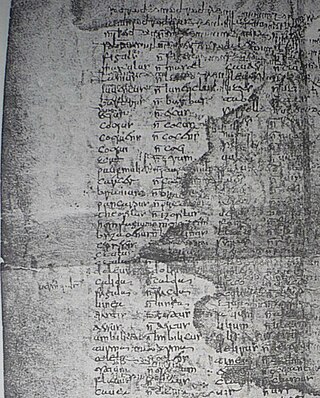Appendix Probi
List of erroneous Latin words From Wikipedia, the free encyclopedia
The Appendix Probi ("Probus' Appendix") is the conventional name for a series of five documents believed to have been copied in the seventh or eighth century in Bobbio, Italy.[1] Its name derives from the fact that the documents were found attached to a copy of the Instituta Artium, a treatise named after (but probably not written by) the first-century grammarian Marcus Valerius Probus.[2]

Latin Wikisource has original text related to this article:
The Appendix was likely composed in Rome[i] around the first half of the fourth century AD.[4]
It is specifically the third of the five documents that has attracted scholarly attention, as it contains a list of 227 spelling mistakes, along with their corrections, which shed light on the phonological and grammatical changes that the local vernacular was experiencing in the early stages of its development into Romance.
The text survives only in a carelessly transcribed water-damaged manuscript of the 7th or 8th century[5] which is kept at the Biblioteca Nazionale Vittorio Emanuele III[6] as MS Lat. 1 (formerly Vindobonensis 17).
Phenomena visible in the spelling mistakes
Summarize
Perspective
Note that the format is "[correct spelling], not [incorrect spelling]".[7] Scribal abbreviations have been expanded.
Syncope
Development of yod from front vowels in hiatus
Change of /ŭ/ to [o]
Reduction of pretonic /au̯/ to [o]
Loss of final /m/
Loss of /h/
Reduction of /-ns-/ to /-s-/
Loss of intervocalic /β/ before a back vowel
Confusion of /b/ and /β/
Confusion of singletons and geminates
Elimination of imparisyllabic nouns
Adaptation of 3rd-decl. adjectives to the 1st class
Adaptation of 4th-decl. feminine nouns to the 1st decl.
Adaptation of 3rd/4th decl. feminines to the 1st decl. via diminutive suffix
Adaptation of neuter plural to the first declension
Elimination of the ablative
Alteration of nom. -es (in the third declension) to -is
Reduction of the endings -es and -is to -s[v]
Loss of the masculine flexion -us
Metathesis, assimilation, dissimilation, etc.
See also
Notes
- There is a reference on line 134 to caput africae, the name of a grammar school known to have been located in that city.[3]
- An example of hypercorrection (Elcock 1960: 30), in this case the improper insertion of a silent ⟨n⟩, cf. the spellings herculens and occansio below.
- The unusual forms figel and mascel may reflect the replacement of the diminutive ending -ulus with -ellus, followed by the loss of both final /s/ and the unstressed /ŭ/. While the change may seem to foreshadow e.g. the Romansh form maschel, such forms are unusual for the time period and would not be seen again until the Kassel glosses (Elcock 1960: 32).
References
Sources
External links
Wikiwand - on
Seamless Wikipedia browsing. On steroids.
